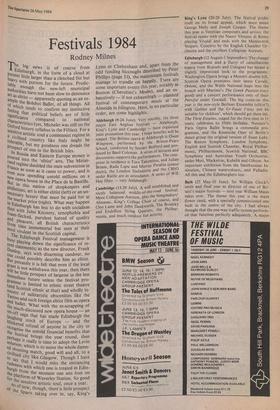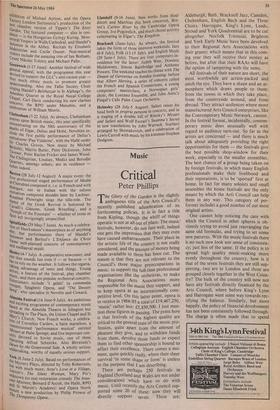Festivals 1984
Rodney MIInes The big news is of course from Edinburgh, in the form of a cloud at Present little larger than a clenched fist but heavy with portent for the future. Predic- tably enough the new-left municipal authorities have not been slow to denounce art as elitist — apparently quoting as an ex- ample the Bolshoi Ballet, of all things. All of which tends to confirm my instinctive feeling that political beliefs are of little significance compared to national characteristics (yes, Michelet was still on the Oxford history syllabus in the Fifties). For a sensitive artistic soul a communist regime in a civilised country like Italy
might be tolerable, but my goodness one dreads the Prospect of one in the British Isles.
In Russia and Eastern Europe money is Poured into the 'elitist' arts. The Mitter- rand regime doubled the state subvention in "'ranee as soon as it came to power, and is even now spending untold millions on a eve now house in the Place de la Bastille. nut in this nation of shopkeepers and Philistines, art is either elitist (left) or an un- necessarY luxury that must be paid for at the market price (right). What may happen In Edinburgh has less to do with socialism than with John Knoxery, xenophobia and warn-flecked, purulent hatred of quality fromn time immemorial but seen at their Most virulent in the Scottish capital. h The Edinburgh Festival management is r„usY Playing down the significance of re- ~,crit statements; as the new director, Frank utinloP, says with disarming candour, no one could possibly describe him as elitist. nut privately it is felt that even if the local grant is not withdrawn this year, then there will ill be little prospect of largesse in the less immediate future unless the festival pro- P.arnme is limited to ethnic street theatre (and Scottish ethnic at that) and wholly in- ...L 11ocent !alto° of militaristic obscenities like the and such foreign elitist filth as opera and ballet. What with the re-scrapping of the much-discussed new opera house — an r-auoff saga that has made Edinburgh the blinked refusal of anyone in the city to the the untold financial benefits that "e festival brings the year round, then ePe.rhaPs it really is time to adopt the Levin solution, which is to move the whole damn- ed shooting match, good will and all, to a civilised city like Glasgow. Though I have ° say that I would miss the entrancing rbuden with which one is treated in Edin- turgh from the moment one sets foot onl, Platform of Waverley Station. So good. for the sensitive artistic soul, once a year. ofAs of now, though, there is little prospect the Sparts taking over in, say, King s Lynn or Cheltenham and, apart from the odd funding hiccoughs described by Peter Phillips (page 31), the mainstream festivals manage to trundle on happily. VIere are some important events this year, notably at Buxton (Cherubini's Medee), and an ex- haustively — if not exhaustingly — planned festival of contemporary music at the Almeida in Islington. Here, in no particular order, are some highlights.
Aldeburgh (8-24 June). Very sensibly, the three major East Anglian festivals — Aldeburgh, King's Lynn and Cambridge — have organised joint promotion this year. I hope benefits will be reaped. The Britten opera at Aldeburgh is Owen Wingrave, performed by the Britten-Pears School, conducted by Steuart Bedford and pro- duced by Basil Coleman. A series of lectures and discussions supports the performances. The com- poser in residence is Toru Takemitsu, and Julian Bream, Radu Lupu and Murray Perahia (piano duets), the London Sinfonietta and the CBSO under Rattle are in attendance. A series of Will I-lay films — very Aldeburgh.
Cambridge (13-29 July). A well established and nicely balanced middle-of-the-road festival. More Collegium Aureum, plus the Songmakers' Almanac, King's College Choir of course, and Cleo Laine and John Dankworth. The Brodsky and Endellion String Quartets,
the Philhar- monia, and much outdoor fun activity. King's Lynn (20-28 July). The festival prides itself on its broad appeal, which must mean George Melly and Joseph Cooper. The theme this year is Venetian composers and artists; the festival opens with the Nuovi Virtuosi di Roma playing Vivaldi and ends with the Monteverdi Vespers. Concerts by the English Chamber Or- chestra and the excellent Collegium Aureum.
Edinburgh (12 August-I September). The change of management and a flurry of cancellations (opera from Brussels and Cologne) has meant a slightly improvised look to the programme. Washington Opera brings a Menotti double bill, Scottish Opera premieres their latest Cavalli, Orione, and the Welsh National leaps into the breach with Martinu's The Greek Passion (very good) and a concert performance only of their Parstfal under Goodall. The big come-on this year is the new-style Berliner Ensemble (elitist?) with Galileo and the Ur-Faust ('may not be suitable for children', which should get them in). The Thrie Estaifes, staged for the first time in 11 years, celebrates its 350th birthday. Nureyev's Paris Opera Ballet brings a commedia pro- gramme, and the Komische Oper of Berlin's dance group the original version of Swan Lake. The Boston Symphony, London Symphony, English and Scottish Chamber, Royal Philhar- monic, Philharmonia, Scottish National, BBC Symphony and Australian Youth Orchestras, under Muti, Mackerras, Kubelik and Gibson. An important exhibition from the Smithsonian In- stitution, Chinese watercolours, and Palladio. All this and the Edinburghers too.
Bath (25 May-10 June). Sir William Glock's tenth and final year as director of one of Bri- tain's major festivals — next year William Mann takes over. The theme this year is the maze (lower case), with a. specially commissioned one built in the centre of the city. I had always thought that the one-way traffic system perform- ed that function perfectly adequately. A major raibition of Michael Ayrton, and the Opera Factory London Sinfonietta's production of the new chamber version of Tippett's The Knot Garden. The featured composer — also in resi- dence — is the Hungarian Gy6rgy Kurtag. Mon- teverdi Vespers in Wells Cathedral, and Handel's Solomon in the Abbey. Recitals by Elisabeth Soderstrom and Cecile Ousset. Non-musical visitors include the amazing trio of Ian Botham, Count Nikolai Tolstoy and Michael Palin. Greenwich (1-17 June). Another festival of wide general appeal, with the programme this year devised to support the GLC's anti-racism year — us much ethnic music to promote greater understanding. Also the Tallis Society Choir singing Handel's Belshazzar in St Alphege's, the 'istladeus Quartet in the Royal Naval College Chapet, Carl Davis conducting his new clarinet concerto, the RPO under Menuhin, and a celebration of William Morris.
Cheltenham (7-22 July). As always, Cheltenham centres upon British music, this year specifically concentrating on the 50th anniversary of the deaths of Elgar, Delius and Hoist, Novelties in- clude the first public performance of Delius's "1elodrome Paa Vidderne', with the Halle under Sir Charles Groves. New music by Michael Berkeley, Martin Butler, Peter Dickinson, John T T/eller, Peter Racine Fricker and James Wood. The Chilingirian, Lindsay, Medici and Borodin Quartets, amongs others, are in residence riches indeed.
ifinxt°u (28 July-12 August). A major event: the irst Professional staged performance of Medee asCherubini composed it, i.e. in French and with dialogue not in Italian with the odious riitatives composed decades later by Lachner. th°rsa"nd Plowright sings the title-role. The erne of the Greek Revival is bolstered by Cavalli's Giasone, 'Greek Wrestling', and a ..1.‘lyn11311 of the Fountain' — whether of stone or flesh left intriguingly unspecified. ltitalfields (29 May-7 June). As much a celebra- rn of Hawksmoor's masterpiece as of anything e „se, but performances there of Handel's
301
frame and Berlioz's L'Enfance du Christ
falne well-planned concerts of contemporary and mediaeval music. Henley (4-7 July). A comparative newcomer, and Ze that sounds fun even if — or because — it has to rely on the weather. It follows the regatta, taking advantage of tents and things. Young artists, a feature of the festival, play chamber music, and there are popular orchestral concerts. Entertainers include 'I gelati' (a comtnedia troupe), Spaghetti Opera, and 'The Dessert Song', who specialise in Novello and Coward. Oneida Festival (14 June-9 July). An ambitious andexciting programme of contemporary music based at the Almeida Theatre in Islington but spreading to The Place, the Union Chapel and St t, Church. New French works, a celebra- " nn of Cornelius Cardew, a Satie marathon, a ',,ttunissioned 'performance musical' entitled inozart at Palm Springs, and five important con- ce rts devoted to Soviet music, one of them featuring Alfred Schnittke. Also Birtwistle's i71;v4 by the Greenwood Side. A wholly serious nuertaking, worthy of equally serious support. herk (8 June-2 July). Based on performances of Mystery Plays, directed by Toby Robertson, out , With much more: Arne's Love in a Village, -iin°11son's The Silent Woman, Mary Pix's e krittwn (to me) restoration comedy The Irmo- ent Mistress; Bernard d'Ascoli, the Halle, RPO mount St Martin's Academy; and Opera North i;c:unt a new production by Philip Prowse of e Threepenny Opera.
Llandaff (9-16 June). New works from Hod- dinott and Matthias (his horn concerto), Brit- ten's Curlew River by the Cambridge Opera Group, No Pogorelich, and much choral activity culminating in Elgar's The Kingdom.
Bracknell (June-July). As always, the festival takes the form of three intensive weekends: Jazz (6-8 July), Folk (13-15 July), and English Music (29 June- I July). There are four composers-in- residence for the latter: Judith Weir, Dominic Muldowney, Simon Bainbridge and Anthony Powers. The weekend reaches its climax with The Dream of Gerontius on Sunday evening: before that Albert Herring, a series of concerts called the French and Spanish Connections, a young composers' masterclass, a Norwegian girls' choir, the th I -°ntatto Ensemble, and John Amis's Fingal's Cafe Palm Court Orchestra.
Helmsley (28 July-5 August). Salieri raises his head both in propria persona in concerts, and in a staging of a double bill of Rim sky's Mozart and Salieri and Wolf Ferrari's Susanna's Secret in new translations by John Warrack. Scarlatti arranged by Shostakovich, and a celebration of Lewis Carroll with music by his kinsman Stephen Dodgson.















































 Previous page
Previous page